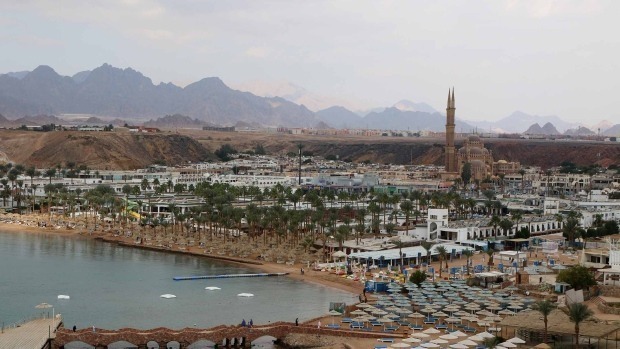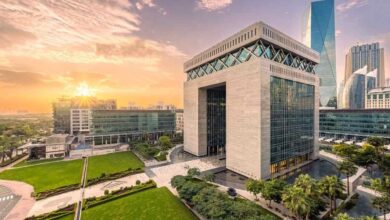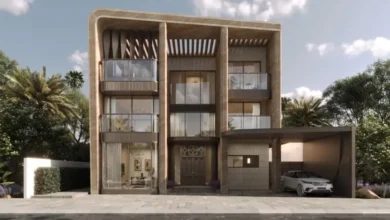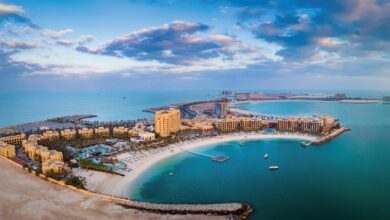
- The deal signifies a deepening of bilateral relations between the UAE and Egypt, with investments spanning various sectors such as infrastructure, energy, tourism, and manufacturing, strengthening economic cooperation and collaboration.
UAE’s $35 Billion Egypt Deal Marks Gulf Powers’ Buying Spree
(Bloomberg Markets) — On a sweltering late-summer evening last year in southern Egypt, the country’s most storied hotel was bustling once again, hosting personalities with ambitions of shaping the world. In the more than a century since it opened, Aswan’s Old Cataract, perched on a rocky outcrop on the Nile River’s eastern bank, has welcomed the likes of Winston Churchill, Jimmy Carter and Tsar Nicholas II. For Agatha Christie, in whose former suite you can now stay for upwards of $8,000 a night, it was the inspiration for one of her most famous works of detective fiction, Death on the Nile.
The guests were more circumspect. More than a dozen high-level officials from the United Arab Emirates wearing flowing white robes arrived for a private dinner, led by a security detail that cordoned off the restaurant, according to four people who were there and requested anonymity to discuss a private gathering. Outdoor air-conditioning units were set up on the terrace so the elite diners could take in the nighttime Nile views in comfort as they sampled grilled meats and sipped tea. After about two hours, they left.
Months later, in January, the purpose of the visit became clear: Abu Dhabi wealth fund ADQ bought a 40.5% interest, valued at $882.5 million, in an Egyptian firm that in turn purchased stakes from the cash-strapped government in seven hotels—including Aswan’s Old Cataract, the Winter Palace in Luxor, Mena House in Cairo and the Cecil Hotel in Alexandria—seen as the crown jewels of the North African nation’s hospitality sector. The UAE had indirectly become part-owners of a slice of Egypt’s touristic legacy.
Digging out of its worst economic crisis in decades, Egypt is putting prized assets up for sale, and the rising powers of the Gulf region are taking out their checkbooks. Over the past nine months, high-profile visitors from Saudi Arabia and Qatar, as well as the UAE, have been sighted up and down the Nile and on the Mediterranean and Red Sea coasts. Their coffers flush with oil and gas revenue, the delegations have been scoping out the investment deals of a century.
On Feb. 23, ADQ also announced a $35 billion investment in Egypt that includes development rights for Ras El-Hekma, a Mediterranean coastal headland about three times the size of Manhattan. It was the biggest deal in Egypt’s history, and Cairo began receiving the cash within days, likely saving the economy. The financing gave Egypt enough firepower to enact a long-awaited—but painful and politically sensitive—currency devaluation, seen as key to restoring investor confidence and drawing more funds. An $8 billion International Monetary Fund loan and World Bank and European Union financing followed.
In the short term, the UAE’s goal was to shore up the economy of a country seen as too big to fail. The fear: a return of the mass unrest and empowered political Islam that roiled the Middle East during the Arab Spring revolts more than a decade ago, threatening established regimes, according to people involved in the decision who were granted anonymity to discuss private and sensitive discussions. In that sense, the logic was similar to earlier UAE pledges such as the one that followed the overthrow of Egypt’s Muslim Brotherhood government in 2013 by Abdel-Fattah El-Sisi, then the army chief, now the president.
The Ras El-Hekma pact represents a whole other order of magnitude. The UAE is pumping in funds equivalent to 7% of the UAE’s gross domestic product. That commitment shows “a new attitude that looks at the return from such economic interventions and tries to reach a win-win formula,” says Ziad Bahaa-Eldin, a former Egyptian deputy prime minister and ex-chief of its investment authority.
Gulf nations promised hefty financial support for Egypt just weeks after Russia’s 2022 invasion of Ukraine helped tip its debt-ridden economy into a crisis long in the making. To avert disaster, wealthy nations on the Arabian Peninsula made a flurry of multibillion-dollar deposits into Egypt’s central bank. ADQ also snapped up $2 billion of shares in Egypt’s biggest listed lender and fertilizer and logistics companies; Saudi Arabia’s sovereign wealth fund invested $1.3 billion in some of the same companies.
A new Gulf consensus had emerged: The days of handouts were over. Riyadh and Abu Dhabi would need a return on whatever they’d pumped in. That switched the focus of Egypt’s broader plan to offloading a swath of government-owned assets, a legacy of the state’s long-running overarching role in economic life.
In February 2023 authorities listed more than 30 companies in which investors could bid for stakes, in sectors including finance, oil, real estate and ports. The list of companies proved by no means exhaustive, with local media frequently reporting possible additions. As of March, the UAE had been the only fellow Arab state to step up consistently. It was the biggest shareholder in two of Egypt’s top three listed companies, Commercial International Bank and Eastern Co. SAE. And the UAE has a close working relationship with the third, real estate developer Talaat Moustafa Group, which will help develop Ras El-Hekma and whose hospitality unit—flush with ADQ funds—now owns those hotel stakes.
Saudi Arabia is jostling with the UAE to be the region’s trendsetter, but it’s been holding back. Concerns over the valuation of Cairo-based United Bank, rooted in the uncertain trajectory of Egypt’s beleaguered pound, led the nation to withdraw from acquisition talks last year. But after the UAE’s Ras El-Hekma deal, Saudi Arabia is looking afresh at its own plan to develop a premium stretch of beachfront near Sharm El-Sheikh on Egypt’s Sinai Peninsula, Bloomberg reported in March.
For its own part, Qatar’s sovereign wealth fund has been in on-again, off-again talks to acquire the Egyptian government’s stake in mobile operator Vodafone Egypt Telecommunications SAE—a prize asset in a nation that’s home to the Middle East’s biggest population, with some 105 million people.
Tourism is an obvious focus of investment, given Egypt’s vast cultural heritage, according to Monica Malik, chief economist at Abu Dhabi Commercial Bank. The government announced plans to boost visitor numbers to 30 million annually by the end of the decade, up from a record 14.9 million last year. Egypt’s tourism assets “really need a significant capital injection to bring them back up to luxury travelers’ standards,” she says. “The Gulf can provide the huge investment alongside an excellent record for project implementation.”
Luxury certainly defines Egypt’s northern coast, a stretch of golden beachfront running west of Alexandria toward the Libyan border. Long a favorite with wealthier Egyptians who summer in villas or apartments in exclusive gated compounds, the area is little visited by Western tourists, despite azure waters that are a match for almost anywhere else on the Mediterranean.
A chain of glitzy seafront residential towers here has caught the eye of Gulf investors. Among those interested is Mohamed Alabbar, founder of Emaar Properties PJSC, according to three people familiar with the matter who requested anonymity to discuss private matters. A proposed sale of a small number of the government-owned towers could bring in as much as $2 billion for Egypt, one person says. About 100 miles to the west, work on the Ras El-Hekma megaproject begins in 2025. The goal: a year-round community such as El-Gouna, a city on Egypt’s Red Sea coast known for its cultural festivals and nightlife. ADQ’s February announcement calls for a $150 billion investment in the area.
Along with the Nile, one strand that connects all those disparate Egyptian locations is a network of roads and Wataniya Petroleum gas stations. That brand, too, is partly up for sale in what would be a watershed—the first privatization of a company owned by Egypt’s powerful military. At various stages, Petromin Corp. of Saudi Arabia and Abu Dhabi National Oil Co. both showed interest in this asset, which would extend their fuel distribution empires.
Authorities have suggested stakes in other military-owned companies may also be up for grabs, a step that would fulfill IMF and World Bank demands to lessen state ownership of businesses. Much of that control dates to the 1960s policies of Gamal Abdel-Nasser, under whose authoritarian rule Egypt became the vanguard of the Arab world. Now the Gulf states have the upper hand, at least financially.
In tightly controlled Egypt, where El-Sisi’s government brooks little dissent, it’s difficult to gauge a genuine public reaction to the sales. Analysts such as Mirette Mabrouk, a senior fellow at the Washington-based Middle East Institute, are doubtful the Gulf’s largess will translate into much influence on Cairo’s decision-making, including on key issues such as the wars in Gaza and Sudan.
On a recent Friday at the Old Cataract (now a Sofitel property), foreign visitors order English afternoon tea for the equivalent of $50. A framed portrait on the wall features a handwritten Arabic note from 1990. The UAE’s founder, Sheikh Zayed bin Sultan Al Nahyan, thanked the hotel’s management for a pleasant stay. Today the government of his son, Sheikh Mohamed bin Zayed Al Nahyan, the UAE’s current ruler, owns a piece of the place.
Magdy and Gunn report from Bloomberg’s Cairo bureau.
©2024 Bloomberg L.P.





